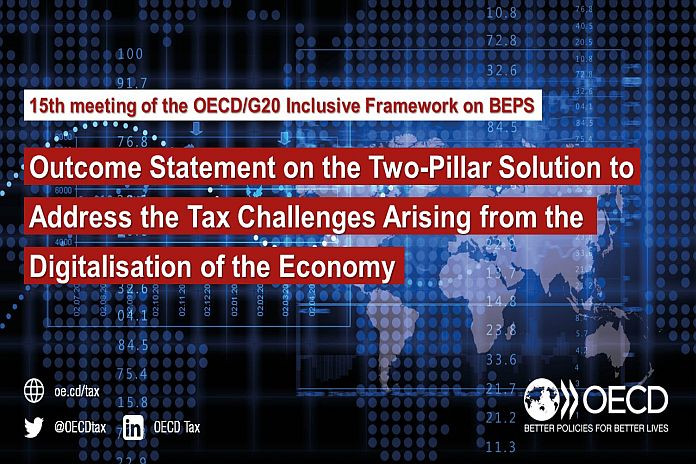PARIS, France, (OECD) – On Tuesday, 138 members of the OECD/G20 Inclusive Framework on Base Erosion and Profit Shifting (BEPS) – representing over 90 percent of global GDP – agreed an Outcome Statement recognising the significant progress made and allowing countries and jurisdictions to move forward with historic, major reform of the international tax system.
The Two‐Pillar Solution to Address the Tax Challenges Arising from the Digitalisation of the Economy will ensure a fairer distribution of profits and taxing rights among countries and jurisdictions with respect to the world’s largest Multinational Enterprises (MNEs).
The Outcome Statement agreed at the 15th Meeting of the Inclusive Framework follows 20 months of intense technical negotiations by delegates to continue the work to implement the Two Pillar Solution. It reflects collaboration and compromise among all jurisdictions – small and large, developing and developed – during negotiations by Inclusive Framework members since October 2021.
The Outcome Statement summarises the package of deliverables developed by the Inclusive Framework to address the remaining elements of the Two‐Pillar Solution:
- A text of a Multilateral Convention (MLC) developed by the Inclusive Framework, which allows jurisdictions to reallocate and exercise a domestic taxing right over a portion of MNE residual profits (Amount A of Pillar One). The Inclusive Framework will publish the text of the MLC once it has been prepared for signature, upon resolution of a small number of specific items, as a few jurisdictions have expressed concerns with some specific items in the MLC;
- A proposed framework for the simplified and streamlined application of the arm’s length principle to in-country baseline marketing and distribution activities (Amount B of Pillar One); where input from stakeholders is requested on certain aspects prior to finalisation;
- The Subject-to-Tax Rule (STTR) together with its implementation framework, which will enable developing countries to update bilateral tax treaties to “tax back” income on certain intra-group income where such income is subject to low or nominal taxation in the other jurisdiction;
- A comprehensive action plan will be prepared by the OECD to support the swift and co-ordinated implementation of the Two-Pillar Solution, coordinating with regional and international organisations.
In a significant development since October 2021, 138 countries and jurisdictions have also agreed in the Outcome Statement to refrain from imposing newly enacted digital services taxes or relevant similar measures on any company before 31 December 2024, or the entry into force of the MLC if earlier, provided the signature of the MLC has made sufficient progress by the end of the year. This commitment is made in recognition of the progress made to date and the need to prevent disruption or delay of the ratification of the MLC.
“The Two-Pillar Solution will provide stability for the international tax system, making it fairer and work better in an increasingly digitalised and globalised world economy,” OECD Secretary-General Mathias Cormann said. “We have all been working intensively on the technical details and on the implementation arrangements that are necessary to make the Two-Pillar Solution a reality.
“The agreement reached yesterday proves that despite the challenges and compromises along the way, multilateral dialogue works and can deliver results to tackle shared challenges requiring shared solutions. This work is critical to governments and our economies – ultimately, to be able to raise the necessary revenue to fund the essential public goods and services for their citizens.”
Next Steps Towards Completion of the Two-Pillar Solution
The newly agreed Outcome Statement will be delivered to G20 finance ministers and central bank governors at their meeting in Gandhinagar, India on 17-18 July.
In parallel, technical work will continue so that the MLC can be opened for signature in the second half of 2023, with a signing ceremony organised by year-end. The MLC should enter into force during 2025, allowing for the domestic consultation, legislative, and administrative processes applicable in each jurisdiction.
Further work on Amount B of Pillar One – to be launched next week with a public consultation, through 1 September – is slated for completion by year-end. The Inclusive Framework plans to approve a final report on Amount B and incorporate key content into the OECD Transfer Pricing Guidelines by January 2024. Due consideration will be given to the needs of low-capacity jurisdictions and the interdependence with the MLC.
The agreed documentation relating to the STTR will be published next week, with the Multilateral Instrument implementing the STTR to be released and open for signature from 2 October 2023.
The OECD will also prepare a comprehensive action plan to support the swift and co-ordinated implementation, with additional support and technical assistance to enhance capacity for implementation by developing countries.





